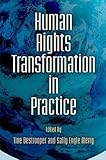Human Rights Transformation in Practice / ed. by Sally Engle Merry, Tine Destrooper.
Material type: TextSeries: Pennsylvania Studies in Human RightsPublisher: Philadelphia : University of Pennsylvania Press, [2018]Copyright date: ©2019Description: 1 online resource (296 p.) : 2 illusContent type:
TextSeries: Pennsylvania Studies in Human RightsPublisher: Philadelphia : University of Pennsylvania Press, [2018]Copyright date: ©2019Description: 1 online resource (296 p.) : 2 illusContent type: - 9780812295467
- 341.4/8 23
- K3240
- online - DeGruyter
| Item type | Current library | Call number | URL | Status | Notes | Barcode | |
|---|---|---|---|---|---|---|---|
 eBook
eBook
|
Biblioteca "Angelicum" Pont. Univ. S.Tommaso d'Aquino Nuvola online | online - DeGruyter (Browse shelf(Opens below)) | Online access | Not for loan (Accesso limitato) | Accesso per gli utenti autorizzati / Access for authorized users | (dgr)9780812295467 |
Frontmatter -- Contents -- Preface -- List of Abbreviations -- Introduction. On Travel, Translation, and Transformation -- Part I. Initiatives by Formal Human Rights Norm-Setters -- Chapter 1. The Escher–Human Rights Escalator: Technologies of the Local -- Chapter 2. Accommodating Local Human Rights Practice at the UN Human Rights Council -- Chapter 3. Human Rights-Based Approaches to Development: The Local, Travel, and Transformation -- Part II. Interactions Between Social Mobilization and Legal Claim-Making -- Chapter 4. Lost Through Translation: Political Dialectics of Eco-Social and Collective Rights in Ecuador -- Chapter 5. Upstreaming or Streamlining? Translating Social Movement Agendas into Legal Claims in Nepal and the Dominican Republic -- Chapter 6. New Visibilities: Challenging Torture and Impunity in Vietnam -- Part III. Human Rights Programs and the Proliferation of Nonconfrontational Methods -- Chapter 7. Rural-Urban Migration and Education in China: Unraveling Responses to Injurious Experiences -- Chapter 8. Localization “Light”: The Travel and Transformation of Nonempowering Human Rights Norms -- Chapter 9. Global Rights, Local Risk: Community Advocacy on Right to Health in China -- Afterword. Our Vernacular Futures -- List of Contributors -- Index -- Acknowledgments
restricted access online access with authorization star
http://purl.org/coar/access_right/c_16ec
Human rights are increasingly described as being in crisis. But are human rights really on the verge of disappearing? Human Rights Transformation in Practice argues that it is certainly the case that human rights organizations in many parts of the world are under threat, but that the ideals of justice, fairness, and equality inherent in human rights remain appealing globally—and that recognizing the continuing importance and strength of human rights requires looking for them in different places. These places are not simply the Human Rights Council or regular meetings of monitoring committees but also the offices of small NGOs and the streets of poor cities.In Human Rights Transformation in Practice, editors Tine Destrooper and Sally Engle Merry collect various approaches to the questions of how human rights travel and how they are transformed, offering a corrective to those perspectives locating human rights only in formal institutions and laws. Contributors to the volume empirically examine several hypotheses about the factors that impact the vernacularization and localization of human rights: how human rights ideals become formalized in local legal systems, sometimes become customary norms, and, at other times, fail to take hold. Case studies explore the ways in which local struggles may inspire the further development of human rights norms at the transnational level. Through these analyses, the essays in Human Rights Transformation in Practice consider how the vernacularization and localization processes may be shaped by different causes of human rights violations, the perceived nature of violations, and the existence of networks and formal avenues for information-sharing.Contributors: Sara L. M. Davis, Ellen Desmet, Tine Destrooper, Mark Goodale, Ken MacLean, Samuel Martínez, Sally Engle Merry, Charmain Mohamed, Vasuki Nesiah, Arne Vandenbogaerde, Wouter Vandenhole, Johannes M. Waldmüller.
Mode of access: Internet via World Wide Web.
In English.
Description based on online resource; title from PDF title page (publisher's Web site, viewed 26. Mai 2021)


